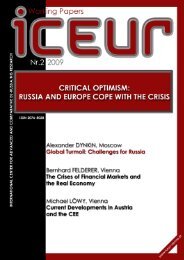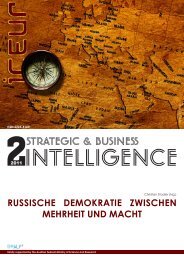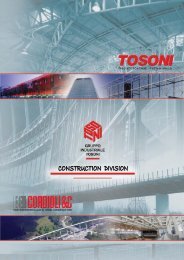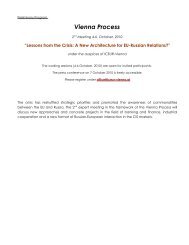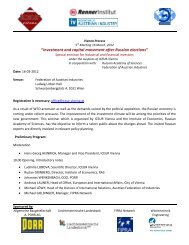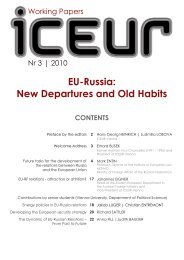IC<strong>EU</strong>R-WORKING PAPERS:ANALYSIS OF RUSSIAN FOREIGN POLICYIC<strong>EU</strong>R was founded by a Vienna-based group of concerned citizens from the academic, international <strong>and</strong>political communities, who are aware of the stalemate in the <strong>EU</strong>-<strong>Russia</strong>n relationship <strong>and</strong> pledge creative newapproaches in research <strong>and</strong> policy consulting.Following an interdisciplinary <strong>and</strong> multidimensional approach, the IC<strong>EU</strong>R explores the complex relationsbetween the <strong>EU</strong> <strong>and</strong> <strong>Russia</strong>/NIS in close cooperation with renowned <strong>Russia</strong>n experts. Scope <strong>for</strong> improvement isidentified <strong>and</strong> profound analyses are provided to relevant experts <strong>and</strong> to the interested general public.In June 2009, IC<strong>EU</strong>R presented the first Working Paper: “Background, Shaping Factors <strong>and</strong> Orientations of<strong>Russia</strong>n Foreign Policy - Inside Views”. The Working Papers are meant to provide a <strong>for</strong>um <strong>for</strong> experts fromEurope, <strong>Russia</strong> <strong>and</strong> the Newly Independent States to comment on current topics.The main part of the first Working Paper is an analysis of the <strong>Russia</strong>n <strong>for</strong>eign policy, written by Andrey Ryabov,scholar-in-residence at the Carnegie Endowment <strong>Center</strong> <strong>for</strong> <strong>International</strong> Peace in Moscow. Ryabov discussesthe relationship between the domestic interests of the <strong>Russia</strong>n elites <strong>and</strong> <strong>for</strong>eign policy, a relationship that isarguably not always comprehensible <strong>for</strong> the West. Ryabov also touches upon the origins of today's elites in<strong>Russia</strong>, by exploring the situation in the nineties that brought about a complex amongst the elites of feelingoffended <strong>and</strong> limited at the same time, <strong>and</strong> a fixation on the status of the “lonely state” which walks along its ownpath. Ryabov argues that conflicts of interest amongst various <strong>Russia</strong>n elite groups make Euro-<strong>Russia</strong>n relationsambiguous, oscillating between collision course <strong>and</strong> consensus-oriented approaches.Shorter articles written by the members of the IC<strong>EU</strong>R team complement Ryabov's analysis <strong>and</strong> discuss otheraspects of the <strong>Russia</strong>n <strong>for</strong>eign policy, such as <strong>EU</strong>-<strong>Russia</strong> relations, NATO-<strong>Russia</strong> relations, implications of thewar in Georgia <strong>and</strong> <strong>Russia</strong>n policy on the Balkans. Two experts from Moldavia analyse the role of <strong>Russia</strong> in theTransnistrian conflict. The <strong>for</strong>eword was provided by Johannes Hahn, the Austrian Federal Minister of Science<strong>and</strong> Research. Mr. Hahn stresses the importance of international scientific cooperation, which is a field to whichthe IC<strong>EU</strong>R can make a substantial contribution.– 1 –
INTRODUCTION TO THE TOPIC:RUSSIA – <strong>EU</strong>:WHAT CAN WE EXPECT FROM EACH OTHER?Ludmilla LOBOVAThe Iron Curtain fell more than twenty years ago. The Soviet Union suffered defeat in the Cold War not onlyideologically, but also in geo-economic terms. <strong>Russia</strong>, as the legal successor of the Soviet Union, has not becomepart of the European security system. During the nineties, <strong>Russia</strong> neither succeeded in building up a more or lessdurable coalition with the USA or NATO, nor did it enter into a stable partnership with the <strong>EU</strong>. Eventually,Europe started building up its security system based on two pillars, namely the <strong>EU</strong> <strong>and</strong> NATO. <strong>Russia</strong> wasdoomed to assume the role of an unaffiliated player, both opposing the West <strong>and</strong> cooperating with it.However, meanwhile it has become obvious that hushing up the problems between <strong>Russia</strong> <strong>and</strong> the West will notwork out in the future. Moscow is openly revising the rules of the game regarding its relations to the West,established in the nineties, a period of proceeding disintegration. <strong>Russia</strong> also resolutely determines its spheres ofinfluence, which was strikingly demonstrated during the five-day war in Georgia in August 2008.The main lesson learned from the development of <strong>Russia</strong>n-Georgian relations, is that the limits of NATOenlargementcomprising the CIS countries (Ukraine <strong>and</strong> Georgia) could not be reached.The second lesson learned from the war refers to the fact that international relations have not changed in theircore since the Cold War. Not only has the classic “strong h<strong>and</strong>” in politics remained, but, on the contrary, it hasseen an impressive comeback.<strong>Russia</strong> is again fighting <strong>for</strong> its influence over the CIS-countries, <strong>and</strong> in its attempts to do so, it benefits from theeconomic crisis in the region. This crisis will also obtain a geopolitical dimension. It is exactly the crisis thatgives <strong>Russia</strong> justification to intensify its influence in the post-Soviet area <strong>and</strong> build a strong economic basis <strong>for</strong>its own centre of power.Yet again the West is confronted with the question of how to deal with <strong>Russia</strong>. Up until now, there have been noreasons to hope that the <strong>EU</strong> <strong>and</strong> <strong>Russia</strong> could come up with an innovative model <strong>for</strong> long-term cooperation anytime soon. The countries of classic capitalism pursuing their values of political democracy <strong>and</strong> free marketeconomy have not yet found suitable schemes <strong>for</strong> cooperating with the countries of the new “authoritariancapitalism”, such as China, <strong>Russia</strong>, Kazakhstan <strong>and</strong> South-East-Asian countries, which are rising dynamically.<strong>Russia</strong> perceives itself as the global leader regarding its control over energy resources <strong>and</strong> in charge ofreallocating <strong>and</strong> shifting the global economic per<strong>for</strong>mance from the West to Asia. All this is taking place whilethe traditional West still dominates the global media space. It is a very complex task to come up with newstrategies <strong>for</strong> relations between <strong>Russia</strong> <strong>and</strong> the <strong>EU</strong>. <strong>Russia</strong>'s comeback came as a surprise <strong>for</strong> everybody,whereas, e.g., it took China three decades to boost its economy.Today, <strong>Russia</strong> plays both the role of an antagonist <strong>and</strong> a partner <strong>for</strong> the West. There<strong>for</strong>e, European politicians willboth stick to the politics of <strong>Russia</strong>'s containment <strong>and</strong> still offer <strong>Russia</strong> the perspective of fruitful <strong>and</strong> constructiverelations.However, it is important to bear in mind that <strong>Russia</strong>n <strong>for</strong>eign policy will continue to mirror domestic problems,<strong>Russia</strong>n domestic policy being primarily determined by factors such as democratic deficit, corruption, lack ofmodernization <strong>and</strong> the heterogeneous multinational population which has not yet succeeded in <strong>for</strong>ming a unified<strong>Russia</strong>n nation.– 2 –




